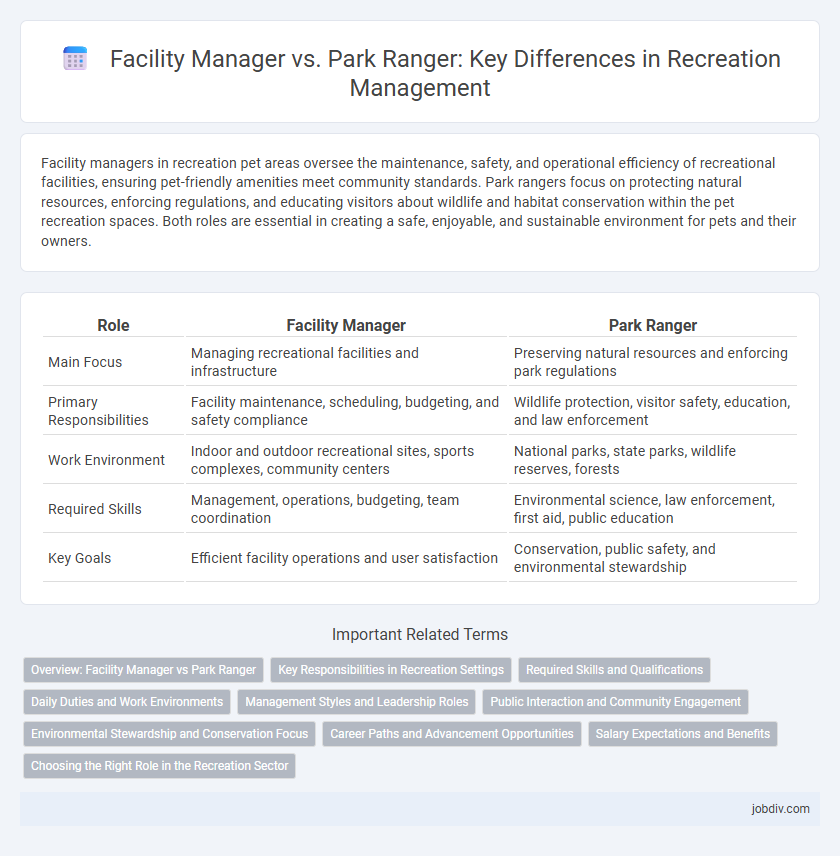Facility managers in recreation pet areas oversee the maintenance, safety, and operational efficiency of recreational facilities, ensuring pet-friendly amenities meet community standards. Park rangers focus on protecting natural resources, enforcing regulations, and educating visitors about wildlife and habitat conservation within the pet recreation spaces. Both roles are essential in creating a safe, enjoyable, and sustainable environment for pets and their owners.
Table of Comparison
| Role | Facility Manager | Park Ranger |
|---|---|---|
| Main Focus | Managing recreational facilities and infrastructure | Preserving natural resources and enforcing park regulations |
| Primary Responsibilities | Facility maintenance, scheduling, budgeting, and safety compliance | Wildlife protection, visitor safety, education, and law enforcement |
| Work Environment | Indoor and outdoor recreational sites, sports complexes, community centers | National parks, state parks, wildlife reserves, forests |
| Required Skills | Management, operations, budgeting, team coordination | Environmental science, law enforcement, first aid, public education |
| Key Goals | Efficient facility operations and user satisfaction | Conservation, public safety, and environmental stewardship |
Overview: Facility Manager vs Park Ranger
A Facility Manager in recreation oversees the maintenance, operations, and safety of recreational buildings and amenities, ensuring optimal user experience and compliance with regulations. Park Rangers focus on protecting natural resources, enforcing park rules, and educating visitors about conservation and park history. Both roles are essential for managing recreational environments but differ in scope, with Facility Managers prioritizing infrastructure and Park Rangers emphasizing environmental stewardship.
Key Responsibilities in Recreation Settings
Facility Managers in recreation settings oversee the maintenance, safety, and operational efficiency of recreational facilities, ensuring compliance with health regulations and managing budgets for repairs and upgrades. Park Rangers focus on conservation efforts, visitor education, and enforcing park rules to protect natural resources while enhancing the recreational experience. Both roles require coordination with staff and stakeholders to support sustainable and safe outdoor activities.
Required Skills and Qualifications
Facility Managers in recreation require strong organizational, budgeting, and leadership skills, often holding degrees in business administration or facilities management. Park Rangers need expertise in environmental science, law enforcement, and public safety, typically possessing certifications in wildlife management or emergency response. Both roles demand excellent communication and problem-solving abilities to effectively manage recreational spaces and ensure visitor safety.
Daily Duties and Work Environments
Facility managers oversee the maintenance, safety, and operational efficiency of recreational buildings and amenities, coordinating staff and managing budgets to ensure smooth facility functioning. Park rangers conduct daily patrols, provide visitor education, enforce park regulations, and monitor natural resources to protect wildlife and habitats. Facility managers typically work in offices or indoor recreational centers, while park rangers spend most of their time outdoors in national, state, or local parks.
Management Styles and Leadership Roles
Facility managers in recreation emphasize strategic planning, resource allocation, and operational oversight to ensure efficient maintenance and user satisfaction, often adopting a task-oriented management style. Park rangers focus on environmental stewardship, visitor education, and enforcement of park regulations, typically embracing a servant leadership approach that prioritizes community engagement and conservation. Both roles require strong communication skills and decision-making abilities but differ in their primary objectives--facility managers prioritize infrastructure management while park rangers lead through advocacy and protection of natural resources.
Public Interaction and Community Engagement
Facility managers in recreation oversee the maintenance and operations of recreational sites, ensuring safety and accessibility while engaging with the public to address facility-related concerns and feedback. Park rangers focus more on direct public interaction through educational programs, wildlife preservation, and enforcing regulations to enhance visitor experience and protect natural resources. Both roles require strong community engagement skills but differ in their emphasis on operational management versus environmental stewardship and visitor education.
Environmental Stewardship and Conservation Focus
Facility managers oversee maintenance and operations of recreational amenities, ensuring infrastructure supports environmental sustainability through efficient resource management and minimal ecological impact. Park rangers specialize in environmental stewardship by actively conserving natural habitats, enforcing regulations, and educating visitors on ecosystem preservation. Their combined efforts promote balanced recreational use while protecting biodiversity and maintaining ecological integrity.
Career Paths and Advancement Opportunities
Facility Managers in recreation oversee maintenance and operations of recreational centers, advancing through certifications in project management and facility management, often moving into regional or corporate roles. Park Rangers focus on conservation, law enforcement, and public education, with career growth stemming from specialized training in environmental science and natural resource management, leading to senior ranger or supervisory positions. Career paths differ as Facility Managers transition into administrative and strategic roles, while Park Rangers advance through field expertise and leadership in park services.
Salary Expectations and Benefits
Facility managers in recreation typically earn between $55,000 and $85,000 annually, with benefits including health insurance, retirement plans, and paid leave; park rangers have a salary range of $40,000 to $70,000, often complemented by government benefits such as federal employee health coverage and pension programs. Facility managers commonly receive performance bonuses, professional development opportunities, and flexible working hours, while park rangers benefit from outdoor work environments, hazard pay, and job stability within government agencies. Salary expectations vary based on location, experience, and employer, with facility managers generally positioned in higher-paying urban or corporate sectors compared to park rangers employed by national or state parks.
Choosing the Right Role in the Recreation Sector
Facility managers oversee the maintenance, safety, and operational efficiency of recreational sites, ensuring amenities meet user needs and comply with regulations. Park rangers focus on conservation, visitor education, and enforcing rules within natural parks and protected areas to preserve ecosystems. Selecting the right role depends on an individual's preference for administrative management versus direct environmental stewardship and public interaction.
Facility Manager vs Park Ranger Infographic

 jobdiv.com
jobdiv.com